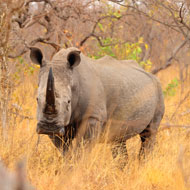
Event held to coincide with World Wildlife Day 2018
Intricate ivory carvings and ornaments were handed in by members of the Australian public on Saturday (3 March) for the country’s first-ever ivory crush.
The event, run to coincide with World Wildlife Day 2018, was organised by local charity ‘For the Love of Wildlife’ and supported by Born Free. Held in Melbourne’s Central Business District, the event saw more than 100kg of ivory and rhinoceros horn destroyed.
Amongst the items fed into the rock crusher included ornaments, jewellery and trinkets. Other items destroyed as part of the ‘crush’ included ivory seized by Australian law enforcement agencies.
“Each and every piece of ivory represents a tragic and unnecessary loss for the individual elephants involved, for their family members and for the ecosystems, in which they played a critical role,” said Will Travers OBE, Born Free’s president and co-founder. “I have stood beside the bodies of poached elephants and rhino. Masses of stinking, rotting flesh, staining the wild earth. No one needs ivory or rhino horn - the only ones who desire it are those making a killing.”
The aim of the event was to show how much more valuable rhinos and elephants are alive, as opposed to mere products for trade.
Across Africa and Asia, both elephants and rhinos continue to be slaughtered in shocking numbers. In South Africa alone, more than 1,000 rhinos have been poached every year since 2013, with 144,000 elephants poached between 2007 and 2014.
In Australia, the scale of illegal ivory and rhino horn is not public knowledge, but it is considered significant. Likewise, the extent of trade on Australia’s borders has not been assessed, but it is believed to be considerable.
A recent survey found that 77 per cent of Australians are unaware that it is illegal to sell ivory in Australia. A further 86 per cent of those surveyed thought the ivory trade should be banned.
“There is often an assumption that a practice as antiquated and out of step with a progressive society, such as trading in wild animal body parts, has been banned many years ago,” Mr Travers continued. “Unfortunately this is not the case at all, and I would encourage citizens of any country to take a close look at what their legislation currently says, and call for change when change is needed.”



 The latest
The latest